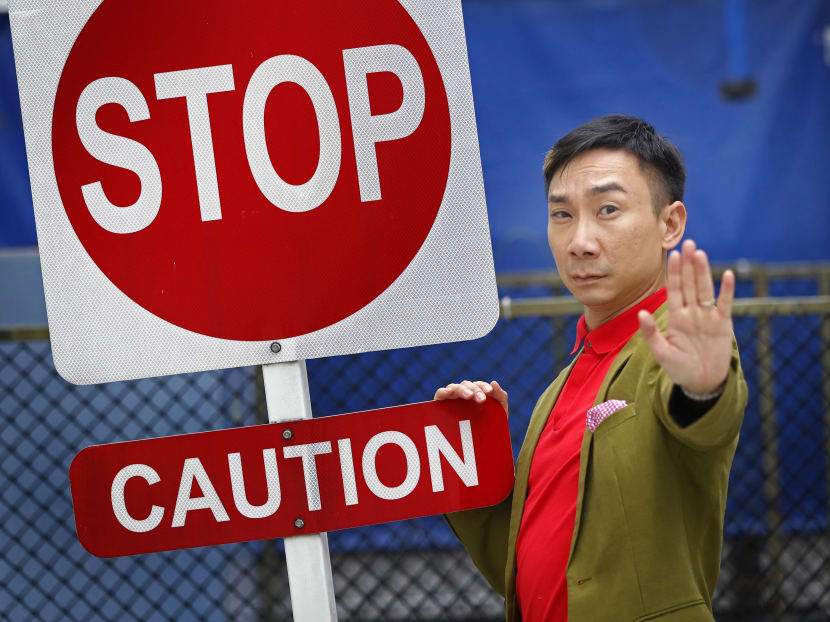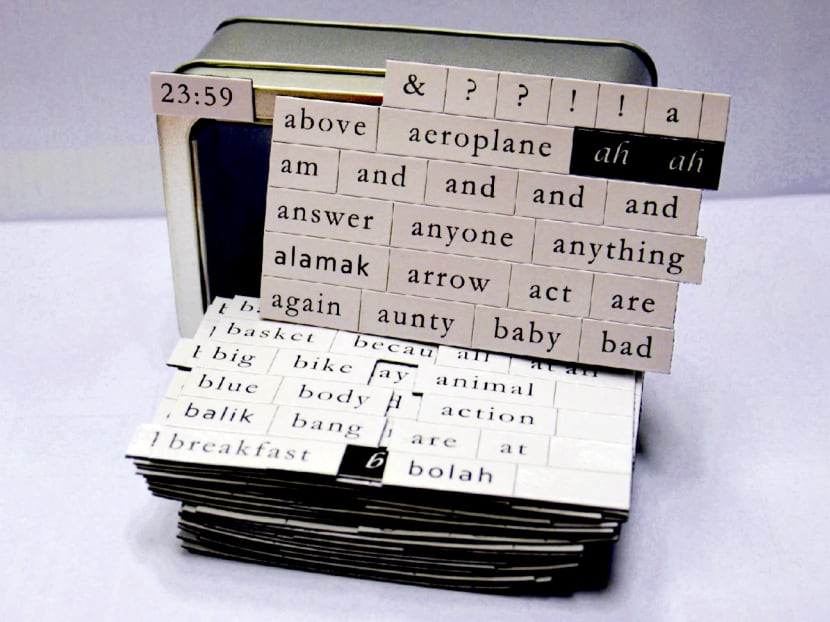National Day Special 2016: Double confirm, Singlish is soo ... us
SINGAPORE — For comedian Hossan Leong, naming his company after the popular Singlish expression “double confirm” has been a double-edged sword. While the phrase from which the name of his firm — Double Confirm Productions — derives is a catchy conversation-starter, it has also drawn flak from strong proponents of standard English, Mr Leong, 47, told TODAY.

Mr Hossan Leong is unapologetic about naming his company after the popular Singlish expression ‘double confirm’. Photo: Raj Nadarajan
SINGAPORE — For comedian Hossan Leong, naming his company after the popular Singlish expression “double confirm” has been a double-edged sword. While the phrase from which the name of his firm — Double Confirm Productions — derives is a catchy conversation-starter, it has also drawn flak from strong proponents of standard English, Mr Leong, 47, told TODAY.
One such critic was a Malaysian lawyer, to whom he had passed a business card. Recalled Mr Leong: “He (went), ‘Oh, but you know it’s not proper English, right?”
“Double confirm”, which means to confirm something twice, was the catchphrase of the We Are Singaporeans TV gameshow he hosted between 2011 and 2014.
The entertainer is unapologetic about its use. “It’s my company ... For me, it doesn’t really matter. If you understand me, I understand you; we communicate, we get the job done,” Mr Leong said.
Indeed, few things in the Republic are at once as deeply loved and as fiercely divisive as Singlish, a mixture of languages including English, Malay and Chinese, and dialects such as Hokkien.
On the one hand, there are those so intrigued by the highways and byways of the distinctly Singaporean brand of English that they undertook efforts, on their own initiative, to compile and codify it.
There are others, on the other hand, who believe that it should not undermine Singaporeans’ use of standard English.
Interest has been swirling around Singlish in recent months, after 19 Singlish words and phrases earned spots in the Oxford English Dictionary in March.
In May, poet and literary critic Gwee Li Sui set off a debate over the use of Singlish in an opinion piece for The New York Times.
He argued that the Government’s efforts to stamp out Singlish over the years had “only made it flourish” and even politicians and officials were using it now.
Dr Gwee said the more the Republic “pushed its purist bilingual policy, the more the territory’s languages met and mingled in Singlish”.
“Through playful, day-to-day conversations, the unofficial composite quickly became a formidable cultural phenomenon,” he wrote, adding that the Singapore Government’s “war on Singlish was doomed from the start”.
The piece drew a riposte from Ms Chang Li Lin, the press secretary to Prime Minister Lee Hsien Loong, who argued that for most Singaporeans, whose mother tongue was not English, mastering English required extra effort. The use of Singlish, she said, would make it harder for Singaporeans to learn and use standard English.

TODAY file photo
SINGLISH ‘A BINDING FACTOR’
While opinions on Singlish occupy a wide spectrum, there is an acknowledgement among those interviewed by TODAY that Singlish remains a powerful means to bring Singaporeans together — wherever in the world they may be.
Linguist Tan Ying Ying said Singlish was a “form of striking solidarity” and Singaporeans used Singlish to form bonds through “something that we share”.
“It’s a bit of a secret language. It’s a mark of friendship, and automatically, you become closer,” added Associate Professor Tan, who heads the Nanyang Technological University’s (NTU) division of linguistics and multilingual studies.
Dr Peter Tan, a senior lecturer in the National University of Singapore’s (NUS) department of English language and literature, said non-standard varieties, such as Singlish, survived because they engendered “a sense of local community”.
“It has the benefit of sounding approachable, local, as opposed to distant or being very serious,” he said, adding that speakers of standard English might pepper their speech with Singlish terms, such as “lah”, to indicate approachability or humour.
Singapore Management University law lecturer Jack Lee, who took it upon himself to start A Dictionary of Singlish and Singapore English in 2004, said Singlish terms conveyed a great deal of meaning, usually in very few words. “You use it for effect … but in a kind of humorous and very Singaporean way,” Assistant Professor Lee said.
Even the Speak Good English Movement’s (SGEM) chairman Goh Eck Kheng acknowledged that Singlish was “part of (the) Singaporean identity” and said that the movement was not opposed to it.
Aside from being a factor that knits Singaporeans together, Singlish also enables foreigners here to foster closer connections with the community.
Australian actor Linden Furnell, 27, who moved to Singapore in 2009 to pursue a musical theatre degree, said some friends had initially found it odd when he spoke Singlish. But he believed an expatriate’s ability to blend in and be understood by heartlanders was “very valuable if you want to earn respect or connect with people”.
Singlish, Mr Furnell said, afforded actors much more detail to work with in portraying authentic characters. “You can create characters that are real, likeable and very human, and more importantly, accessible,” he added.
Still, the use of Singlish — even as a form of entertainment — can provoke dismay. Mr Leong, who was a former radio presenter, recalled receiving complaints from listeners who took umbrage at his use of Singlish on-air. But he shrugged off the complaints.
“I’m here as an entertainer … Why slam something on the programme that is entertaining and that reflects society?”
Describing Singlish as integral to his brand of comedy, Mr Leong said Singlish allowed him to break into characters who would normally “speak like that”, such as an “ah beng” — a boorish man.
A DYNAMIC LANGUAGE BEST LEFT ON ITS OWN
NTU’s Assoc Prof Tan said Singlish should be thought of as a “contact language” separate from English — one that emerged from a linguistic ecological system dating from the pre-colonial period through pre- and post-independence, and continues to evolve today. It is a language that arose from trade, communication and everyday interactions between immigrants and those indigenous to the region, who brought together the various languages that feature in the Singlish lexicon.
Dr Tan, the NUS senior lecturer, takes a different view, seeing Singlish as a “variety of English that has developed in the context of mixing, and the particular kinds of mixing that we have make it Singaporean”.
He added that Singlish was not an issue, so long as the teaching of standard English was done “well and properly” in schools. In this way, people will know how standard English should be used.
SGEM’s Mr Goh said the use of Singlish could affect the English proficiency of a person weak in standard English. “Not everyone can code-switch, so we encourage those who can speak only Singlish to learn standard English,” he said.
Assoc Prof Tan disagreed, believing the use of Singlish would not weaken an individual’s grasp of English, as there was “no subtractive element to language learning”.
“Having one language shouldn’t affect the learning of another. Surely, there will be interferences (and) some element of transference … (but) it shouldn’t have any effect at all (on proficiency),” she said.
Among a fairly-educated group here, such as university students, Assoc Prof Tan was certain they could distinguish between Singlish and standard English, but the lines were less clear outside a university setting.
Ultimately, as with all languages, Singlish is dynamic and evolving constantly, and should be left to develop on its own.
“It’s … a language that every Singaporean has a part to shape,” Assoc Prof Tan said.








